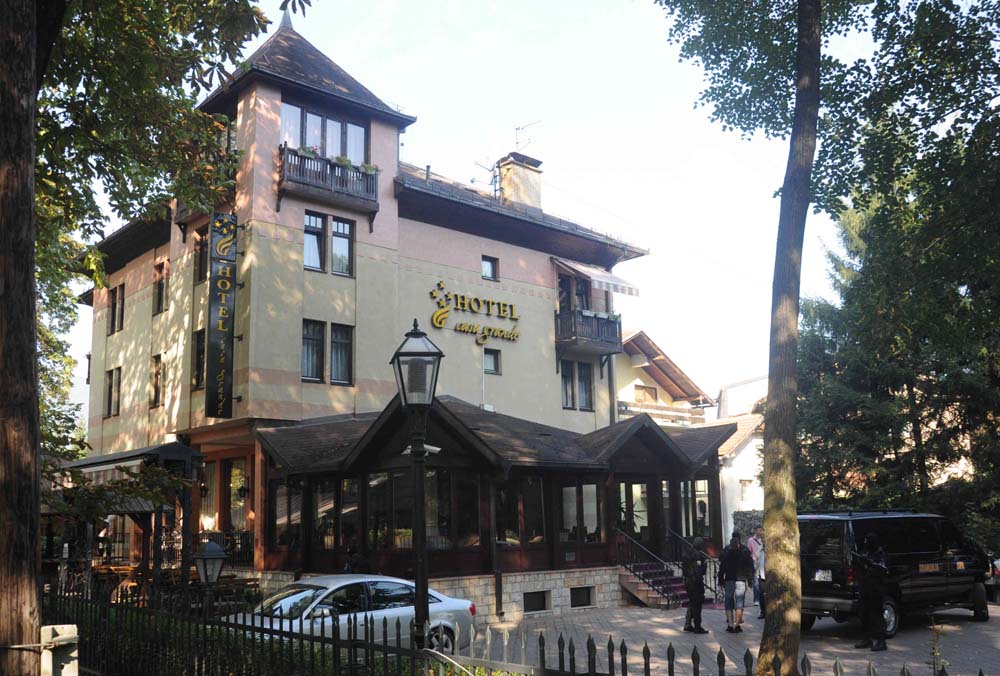The Kosovo prosecutor’s office has charged the Bosnian national with producing and trafficking hundreds of kilograms of heroin, 150,000 ecstasy pills, and 2.5 tons of acetic anhydride, a chemical used to produce heroin.
Kelmendi was also charged with the 2007 murder of Ramiz “Celo” Delalić in Sarajevo. Delalić was an organized crime figure who rose to power after war in Bosnia and Herzegovina in the early 1990s.
Authorities have long investigated the Kosovo-born businessman as the head of one of the most powerful Albanian crime families in the Balkans. According to Interpol and Bosnian authorities, Kelmendi’s organized crime group peddled drugs from Turkey to South America. The group has been investigated for everything from trafficking weapons and cigarettes to loan sharking and extortion.
Kelmendi’s name often comes up in reports on the “Balkan Route” which moves drugs from Afghanistan through Turkey and into Western Europe through Eastern European countries.
However, Bosnian authorities are legally restricted in what they can do about Kelmendi, because BiH—along with Serbia and Russia—does not recognize Kosovo as a sovereign country.
Bosnia and Herzegovina’s stance is based on the vocal protests of Republika Srpska (RS), one of two political entities that share the country. The majority-Serb RS is aligned with Serbia, which regards Kosovo as part of its territory and takes a firm stance against Kosovo’s 2008 declaration of independence.
This has significant legal implications in the Kelmendi case. Though local Bosnian law enforcement has spent years investigating Kelmendi, the prosecutor’s office is not filing charges against him.
This is noteworthy considering how entrenched Kelmendi’s reach is in Bosnia and Herzegovina.
 According to OCCRP partner the Center for Investigative Reporting in Sarajevo (CIN) Kelmendi has more than US$ 4 million worth of property in the country, including the Adolado ice cream factory, the swanky Casa Grande hotel in the Ilidža suburb of Sarajevo, and four houses. Kelmendi describes himself as a worker in the hospitality and ice cream business who earns US$ 250 a month, the minimum wage for nationals of Bosnia and Herzegovina.
According to OCCRP partner the Center for Investigative Reporting in Sarajevo (CIN) Kelmendi has more than US$ 4 million worth of property in the country, including the Adolado ice cream factory, the swanky Casa Grande hotel in the Ilidža suburb of Sarajevo, and four houses. Kelmendi describes himself as a worker in the hospitality and ice cream business who earns US$ 250 a month, the minimum wage for nationals of Bosnia and Herzegovina.
Since 2005, Sarajevo police have filed more than a dozen criminal complaints against Kelmendi and his sons— Elvis, Liridon, and Besnik—including charges of murder, attempted murder, and assault.
When Kosovo police arrested Kelmendi in May 2013, it was on an international warrant issued by Bosnian authorities.
Initially, however, that was not enough to keep him in custody.
Under Kosovo law, Kosovo citizens cannot be held for extradition when there is no valid international agreement available. He had to be released after 48 hours.
When Kelmendi was released, he was immediately arrested on fresh charges filed by the Kosovo Special Prosecution Office, according to a press release from EULEX, the European Union’s Rule of Law Mission in Kosovo. Kelmendi’s arrest was “based on the same offences he has been accused of in Bosnia and Herzegovina.”
Since then, for more than a year, EULEX has continued to use legal maneuvers to keep him detained. In May 2013, October 2013, and April 2014 the office issued “detentions on remand, ” extending his imprisonment months at a time because the case posed “a threat of violence” and a flight risk.
BiH Prosecutor Dubravko Čampara said that he has been collecting evidence and providing it to Kosovo authorities since last year, and that Bosnian authorities continue to investigate Kelmendi and members of his family. However, he has despaired of BIH action against Kelmendi because of the situation.
“He [Kelmendi] has citizenship in Kosovo. Extradition is impossible,” he explained.
As of last year, 88 countries including the United States, Switzerland, and Montenegro recognize Kosovo. For now, Bosnia and Herzegovina, the only jurisdiction mentioned in the Kosovo indictment as a crime scene, remains tied in political knots.




